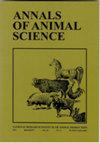胸腺醌对热应激家兔抗氧化、氧化、促炎反应、精液性状和睾丸变化的影响
IF 2.2
4区 农林科学
Q2 AGRICULTURE, DAIRY & ANIMAL SCIENCE
引用次数: 1
摘要
摘要热应激(HS)对兔的健康、福利和生殖特性具有严重的影响。胸腺醌(THQ)是一种天然分子,具有强大的抗氧化、抗菌和抗炎特性。此后,应用三个月的喂养研究来评估富含THQ的饮食在改善应激兔的健康、精液属性和睾丸变化方面的作用。本研究使用40只兔雄鹿,在夏季连续三个月喂食含0(THQ0;作为热应激组)、100(THQ100)、200(THQ200)和400(THQ400)mg/kg THQ的日粮。结果显示,THQ显著提高了FBW(最终体重)、DBWG(每日体重增加)和FI(采食量),但不影响FCR(饲料转化率)。与THQ0组相比,饮食中添加THQ可显著降低肌酐、TB(总胆红素)、TG(甘油三酯)和GGT(γ-谷氨酰转移酶)水平。接受200mg THQ的雄鹿比其他组具有更高的TAC(总抗氧化能力)和GSH(谷胱甘肽)。同时,与THQ组相比,THQ治疗组的MDA显著减少。干扰素γ(IFN-ᵞ) 和白细胞介素-4(IL-4)显著降低(P<0.001),但与TH0组相比,添加THQ(200和400mg/kg)的雄鹿的一氧化氮和溶酶体活性显著增加。利比多评分和反应时间显著改善THQ饮食纳入。THQ100和THQ200组的精液属性,包括体积、活力、浓度和活力,显著增强。睾丸组织的组织学筛查显示,暴露于HS的雄鹿睾丸组织发生中度至重度退行性坏死变化。补充不同水平的THQ增强了这一点。总的来说,THQ(200或400毫克/公斤饮食)可以通过增强抗氧化剂和减少炎症细胞因子来改善健康、精液属性并恢复兔睾丸损伤。本文章由计算机程序翻译,如有差异,请以英文原文为准。
Effects of dietary thymoquinone inclusion on antioxidative, oxidative, pro-inflammatory responses, semen attributes and testicular changes in heat-stressed rabbit bucks
Abstract Heat stress (HS) is considered a severe concern for rabbit buck’s health, welfare and reproductive features. Thymoquinone (THQ) is a natural molecule with robust antioxidant, antimicrobial, and anti-inflammatory properties. Thereafter, three months of feeding research was applied to assess the role of THQ-enriched diets in improving the health, semen attributes and testicular changes of stressed rabbit bucks. Forty rabbit bucks were used in this research, and animals were fed diets containing 0 (THQ0; serve as a heat stress group), 100 (THQ100), 200 (THQ200), and 400 (THQ400) mg/kg of THQ for three months continually during the summer season. Outcomes displayed that THQ significantly enhanced FBW (final body weight), DBWG (daily body weight gain), and FI (feed intake) but did not affect FCR (feed conversion ratio). Compared with the THQ0 group, dietary THQ addition significantly decreased creatinine, TB (total bilirubin), TG (triglycerides), and GGT (gamma-glutamyl transferase) levels. Bucks receiving 200 mg of THQ had higher TAC (total antioxidant capacity) and GSH (glutathione) than other groups. At the same time, MDA was significantly shrunk in THQ-treated groups relative to the THQ group. The levels of interferon-gamma (IFN-ᵞ) and interleukin-4 (IL-4) were significantly diminished (P <0.001), but nitric oxide and lysosome activity were significantly increased in bucks given diets containing THQ (200 and 400 mg/kg) as relative to the TH0 group. Libido score and reaction time were significantly improved by THQ dietary inclusion. Semen attributes, including volume, motility, concentration, and vitality, were significantly augmented in THQ100 and THQ200 groups. Histological screening of testicular tissues showed moderate to severe degenerative and necrotic changes in the testicular tissues of bucks exposed to HS. This was enhanced with the supplementation of THQ at different levels. Collectively, THQ (200 or 400mg /kg diet) can improve health, semen attributes and restore testicular damage in rabbit bucks via boosting antioxidant and reducing inflammatory cytokines.
求助全文
通过发布文献求助,成功后即可免费获取论文全文。
去求助
来源期刊

Annals of Animal Science
农林科学-奶制品与动物科学
CiteScore
4.00
自引率
5.30%
发文量
138
审稿时长
6-12 weeks
期刊介绍:
Annals of Animal Science accepts original papers and reviews from the different topics of animal science: genetic and farm animal breeding, the biology, physiology and reproduction of animals, animal nutrition and feedstuffs, environment, hygiene and animal production technology, quality of animal origin products, economics and the organization of animal production.
 求助内容:
求助内容: 应助结果提醒方式:
应助结果提醒方式:


